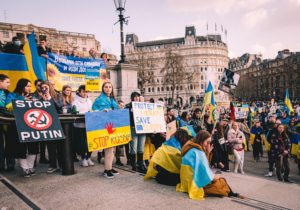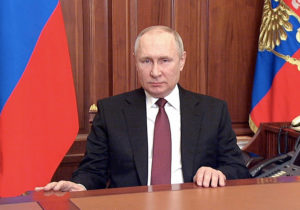Providence editors Mark Tooley and Marc LiVecche discuss Abigail Lindner and Eric Patterson’s article on G.K. Chesterton and war memorials, Lubomir Ondrasek’s piece on Czech leader Vaclav Havel’s warning against hatred, and Lee Trepanier’s counsel for how Russian Orthodoxy, lacking the Just War tradition, can oppose injustice with church teaching on personhood. Here’s transcript:
Mark Tooley: Hello, this is Mark Tooley editor of Providence: A Journal of Christianity and American Foreign Policy with another episode of Marksism with fellow Marc and fellow editor Marc LiVecche missing the third leg of our triad Marc Melton off today but Marc LiVecche and I will carry the load examining three pieces from Providence this week, one from our contributor Eric Patterson on the importance of monuments, as it relates to Memorial Day. Another piece by our Czech friend Lubomir Ondrasek calling the legacy of the first president of a post-Communist Czechoslovakia Václav Havel’s refusal to hate. So, we’ll take a look at his reasons for not hating. And then, finally, a piece from a new contributor from Samford University Lee Trepanier on why Russian Christianity does not have a just war tradition. So, in terms of critiquing the Russian Orthodox spiritual backing for Russia’s invasion of Ukraine, Lee addressed calling upon Eastern orthodoxy’s teaching regarding human personhood which would affirm human rights. But first let’s take a quick look at Eric Patterson’s piece on the importance of monuments specifically Eric is looking at what G.K. Chesterton had to say about war memorials specifically, apparently in Chesterton’s time monuments to great men had shifted to a more realistic pose and Chesterton seem to prefer a more over the top of metaphorical pose of monuments, believing they better captured I suppose the grandness of the nation’s majesty. Obviously, such grandness is out of fashion today on many levels as our monuments to great persons. Can someone be great if they live before our own time, they did not have our own contemporary attitudes that’s very much the argument today. But Marc LiVecche do you share Chesterton and Eric Patterson’s preference for grandiose war monuments?
Marc LiVecche: Yeah, a slightly qualified, yes, in that I also have a place in my heart for the more you know straightforward realistic ones, but sure the soaring sort of triumphs to, as Chesterton said and Patterson quoted “those things of which we are not ashamed,” those are to be welcomed. We’ve talked here before, and our print journal used to convey this I think really well, that public monuments, art pieces in general, have a pedagogical value to remind us of things we ought never to forget and for that and many other reasons, I think public monuments are salutary I think they’re important transferers, they help to convey important lessons from our past. I remember numerous occasions walking in parks, with my kids and they might say, “Daddy who’s that.” And if I happen to know, then I can wax eloquent on important stories about what it means to be an American or what those who have come before us do.
I think particularly with Memorial Day, this is what one of Eric Patterson’s ongoing efforts is to remind us of what Memorial Day actually is all about. And he’ll separate it out from Veteran’s Day and Armed Services Day because Americans, as he points out, we’ve even forgotten what Memorial Day itself means. I noted that Annapolis, of all cities, is going to have a Memorial Day parade. I thought oh that’s interesting what would be a Memorial Day parade? Where they’ll be veterans there’ll be first responders and a promise of corvettes. Which is all terribly exciting, and I love to see them parade but I’m not really sure what that has to do with those who have fallen fighting for our nation, and so you know it’s off by degrees. I think his essay is such an important insight that not only should we remember the statues themselves, but we should set aside particular days in which we remember those who have fallen for our nation. What about you do you like the flamboyant statues or are you the more strait-laced realistic statue kind of guy.
Mark Tooley: No, I appreciate the grandiose. I recently had a debate with one of our young staffers here about the Apotheosis of George Washington, which is on the ceiling of the U.S. Capitol showing Washington ascending into the heavens accompanied by the angels, and the virtues et cetera which I think is very wonderful. Our young staffer thought it was perhaps over the top, even idolatrous and I said, no, metaphorically illustrates the greatness of the man, and the greatness of the founding of America as long as we take it in perspective and don’t take it too seriously.
Marc LiVecche: Right and that is as true for the Dome of the capital as it is for pop music, right, you can’t take the sentiment to literally doesn’t go with the strength. You should be able to manage metaphors absolutely.
Mark Tooley: Just have fun with it. In terms of Václav Havel and the speech whom Lubomir highlights in his article that Václav despite having been imprisoned by the Communists when they still control Czechoslovakia, made it a point of refusing to hate he did not seek reprisals, was not seeking vengeance. He thought hatred represented a, my words not his, a Luciferian impulse, that it was transcendent, that it was rejecting the legitimacy of the people you were hating, and that it basically was insisting that you alone represented pure truth. So, hatred is especially dangerous Havel and Lubomir believe for a new young nation throwing off the shackles from this previous tyranny, certainly, that was a wonderful example from Havel. I suppose Nelson Mandela also offered that example and Lubomir also cites Havel’s professed commitment to seeking to proclaiming the truth. Seems to me as Christian realists we need to be modest in claiming to have this truth but certainly we agree we should be pursuing that truth. Lubomir interestingly recalls that the truth, plays an important role and check history and dating all the way back to Jan Hus, the early Protestant reformer who was literally incinerated for his pursuit of the true. So, with your own ties Czechoslovakia, Marc your thoughts?
Marc LiVecche: Yeah, and then just happy historic tidbit here, John Huss, you know what whose means in English? Huss means goose. And so supposedly when he was incinerated the Catholics wrote to his followers and said, “your goose is cooked.” I don’t know if that’s true, but I want it to be. That aside, I like a lot of the things that Lubomir is doing in his essay. I like the connection that he makes between sort of modern day wokery and the autocratic regime which oppressed Havel and his neighbors, the fear that both have for open discourse for the pursuit of truth, for the clash of ideas, these are all things that a free society not only benefits from but arguably depends upon and that there’s nothing to be feared from this kind of open dialogue. You know, if you think you’ve got an avenue on the truth, then you should want to hold that up to scrutiny, so all of that is good.
Of course, he’s right in a broad way, in even in a probably a very deep way that hatred has a Luciferian impulse. At the same time, you know I don’t want to be the guy who’s always making a place for hate in the world, but there are some things that are hateful. You know you can parse it and say we don’t hate people we hate what they do we hate ideas we hate regimes. The very pursuit of truth is, I think you’ve suggested, suggests there are some ideas that are praiseworthy and others that are not. And we are to cling to those that are praiseworthy, and we are to abhor those that are not, and so there has to be a place where a kind of abhorrence that is legitimate. Certainly, in Václav Havel case it was proven, if nothing else, his approach toward the regime. You know the open displays of violence and open displays of hatred wouldn’t have worked; they would have been crushed. And nothing good would have come of it. He was in that sense transformative. I certainly don’t mean to say it was only prudential, as you’ve said I’ve some claim to the region, having lived there for 12 years and Lubomir knows just as many stories as I do of Christians under Communism who loved their Communist neighbors even the ones who were party to oppressing them I know people who were put in prison by certain informants and then, when the table’s turned and the wall came down and those informants found themselves out of public favor they extended a hand to them and they reached out to them and they try to help them. And that kind of love and a refusal to hate at maybe a personal level can be transformative and I think we are called to that not just as a means to be transformative, because it is a good in itself. So, Havel I continue to believe is of remarkable, as a Lubomir says, prophet to America, even if a secular prophet, he has he has a lot of good things to remind us of.
Mark Tooley: And then, finally, this piece from Lee Trepanier from Samford University saying the Russian Orthodox don’t have a just war tradition. He says they don’t really even have political theology, that their tradition is more automatic submission to the state and the Church in collaboration or partnership with the state. This helps to explain the lack of critique from the Russian church across centuries of various tyrannies with which it has cohabitated. But most distressingly the Russian patriarch’s support for Putin’s invasion of Ukraine has scandalized many Christians around the world. Lee suggests that there being no just war tradition for the Russian Orthodox Church there, it does have a teaching regarding the human person requiring respect and that facilitates an understanding of human rights. This would be a good theological argument for the Russian Orthodox against the Russia’s aggression with Ukraine. Interesting the Russian and Eastern Orthodox absence of political theology I’m not sure all Eastern Orthodox would agree to that claim, but certainly, the West as Lee points out, has been influenced by Augustine, his idea of the two cities or later with Luther, the two kingdoms concept, that the church in effect has sovereignty against the state. But you, Marc LiVecche, obviously are a just for scholar so what say you to the eastern church’s absence of just war teaching?
Marc LiVecche: Yeah, I appreciate what I think a writer is up to which I take to be in part that the lack of a just war tradition is a poor excuse for you know Russian Orthodox Christians and church leaders to critique Putin. He says you could look at your own tradition, you could turn to personhood as you’ve said in order to make that critique. I appreciate that move, but I think even that is sort of letting the Russian Orthodox Christians, in particular church leaders, to easily off the hook. It doesn’t actually matter to me if you have a codified just war tradition as Augustine and Thomas Aquinas and others have given in the West. This is just me banging my own drum again, but the just war tradition isn’t some sort of new kind of moral legislation. That Christians developed in order to help us think through war. That is something that’s rooted in natural law, rooted in Scripture, rooted in human reason that gives us a moral framework for thinking through complex situations in which goods conflict. In this particular case, when they conflict in something like a war. So, it’s zero excuse whether they have a codified framework or not for them not to be able to identify what is or is not a justified use of force, no matter how closely aligned one is with the government. The President of the United States is closely aligned with the government, he or she should always be able to indicate or to evaluate when the use of force is just for unjust, you don’t need a codified mechanism to do that. His critique of the churches inability to make a critique is certainly spot on.
The question whether or not the Orthodox Church itself has a full blown account of just war, said that way, I think he’s right it doesn’t have the full blown account but we’ve talked before in lauding a book by Alexander Webster and Darrell Cole called The Virtue of War where Webster, who is orthodox, goes through, not a full blown framework for just war and orthodox thought, but what he called you know a recognized understanding of what would be or would not be justified war. He goes through the same sorts of things I went through that the orthodox have a long tradition of wrestling with Scripture, reading the church fathers, going through canon law, going through their sort of hagiographic literature in which they find examples of how to live through those who have come before, devotional literature, modern theologians human reason, all of that, in order to paint something that can be called a justified war kind of framework. Webster even goes through and finds parallels between the codified aspects that we have in the West and then the more tacit aspects that they would have in the East. So just as a sort of an in-house discussion as to whether or not they have a just war tradition, no, they don’t but they certainly have the capacity to recognize a just war from an unjust war. And that very fact, including our writer’s emphasis on personhood, condemns those in the Russian Orthodox Church who have not themselves condemned Putin, they are absolutely without excuse.
Mark Tooley: Alright thank you Marc LiVecche, I hope you have a celebratory and a somber Memorial Day. I plan, possibly to attend the Memorial Day parade here in Washington DC, will you attend the Annapolis parade despite your concerns and misgivings?
Marc LiVecche: I may just to experience it. I have a feeling its going to be the antithesis of a Memorial Day parade but there will be corvettes. We will certainly do something to mark the occasion, I suspect, a good war film, something to remind us of the sacrifices that far too many have made so that we could be free.
Mark Tooley: On that note, thank you for this latest episode of Marksism until next week, bye bye.








 Sponsor a student for Christianity & National Security 2024
Sponsor a student for Christianity & National Security 2024